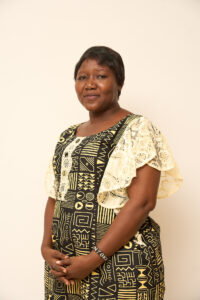Bakhita Nyanut swarms across Awuluic, but like a shadow, the hunger followed. It was May 1998 and the gardens lay desolate in the heart of Aweil, granaries had burnt down and all the strong young men gone to join the Sudan People’s Liberation Movement. The great hunger had begun.
Nyanut crossed the river and glanced back at Aweil town, the place she called home but sadly no longer. She clutched the cross that hung from her neck. “My only companion,” she thought. It had been less than a year earlier when she had been playing under the moonlight with her friends, dancing to tunes of the drums and courting. She scratched her head. Her once rich plaited hair was now short and an orange tint. Her stomach had turned into a tell-tale potbelly of dire malnutrition. She had watched her family members die one after another from either hunger or Murahaleen militia attacks but somehow she survived. She had adapted to the new way of life and chewed almost anything green. Though she was young, she understood her goal better than anyone else. Her goal was survival. She knew she would survive in Aweil but after her Arab master stole into her dwelling one night and forcibly bedded her, she had begun to reconsider a lot of things. Maybe the SPLA was fighting for a just cause contrary to what her master said. Maybe they were air-dropping humanitarian aid in Malualkhon where rumor had it that a new airstrip had been established. Nyanut met a white man who told her that the only thing standing between her and food was the river. If she could swim over that and traveled by night to avoid colliding with the Sudan Armed Forces, she would be in Malualkhon in less than two days.
She looked ahead. The rains had just started and the grass was green along the plains of Awuluic. But amidst the rich pasture, no herds of cattle or sheep could be seen grazing. She swallowed hard. The Baggara militia has taken them all. She moved as fast as her young feet could carry her. The man had told her that she would be in Akuemkou, a smallrural town by sun set if she moved fast enough. A few steps into her journey, she saw a lone Sudan Armed Forces sentry on horseback keeping watch over the plains. She ducked low into the grass. The sentry had not seen her but he was coming towards her, gun slung across his back and a sheathed sword on his hip. He was humming a certain song of Mohammed Wardi but Nyanut wouldn’t tellwhich. She lay down low in the grass and waited for the soldier to pass but he lingered around as if he was looking for something. Nyanut held her breath. She knew what would happen if the soldier saw her. It would be rape then beating afterwards, if she was lucky
enough not to be killed for leaving Aweil town and trying to give a bloodline to the SPLA down at their base in Pariak. At last, the soldier rode towards the river. Nyanut waited patiently until the soldier was out of sight then crept through the grass. She wished it had been June or July so that the grass would have made her invisible, especially as short as she was. She crept on for a time until she felt it was safe to walk and started walking, hellbent on reaching Akuemkou. She reached the outskirts of the small town of Akuemkou before sunset, thanks to the SPLA who were rumored to be gathering in Pariak. The SAF had decided it was better to confine themselves to only protecting Aweil town and the railway line than risk losing them to the SPLA by trying to venture deep into the rural areas. They had left the task of eliminating the SPLA to their ally, Kerubino Kuanyin.
At the outskirts of Akuemkou, Nyanut found a baby suckling her dead mother who lay under a tree. Such was now a common sight in Northern Bahr el ghazel. She looked at the baby and debated whether to take it or not. My goal is survival, she reminded herself. She knew that she wouldn’t carry the baby, at least not as hungry as she was and from the look of the baby, it was obvious that it would die sooner. She gave one last look at the baby who was crying terribly. She sobbed. What’s happening to Mading Aweil? She had seen a lot of suffering but that didn’t stop her from crying every time she saw people suffer. Akuemkou was no longer the prosperous town she had heard her mother talk about before. It was now more of a village. On the streets, she saw children with orange-tinted hair like herself but there weren’t many. Those who could walk had gone to join the SPLA in Pariak. The SPLA was worshipped as saviors here but there were also rumors that the SPLA soldiers rapped young girls and that they had triggered the great hunger by eating up what the civilians had stored and taken their cattle. She wouldn’t go to Pariak, no. She would go to Malualkhon where Operation Lifeline Sudan was air-dropping food. To her, it was the only food that mattered then. She rubbed her belly. I’ll start the journey for Malualkhon tomorrow, I’ll get food. She fell asleep seated in the street where everyone looked at each other with yarning. The sort of look that said, ‘If only humans could be eaten!’
Bakhita woke up to a rumbling stomach at dawn. She chewed a few leaves and drunk some water. When she began chewing leaves, it had been hard, almost like being forced to eat something you don’t like. But over time, she had accepted the leaves, even looked forward to chewing them. She always reminded herself that race was all about survival. She ate the last piece of bread she had come with from Aweil and set off for Malualkhon via Wanyjok. She moved swiftly along the road to Wanyjok. Further east, she heard a distant sound of gunshots. Some travelers said that Kerubino Kuanyin was engaged in battle with the SPLA in Pariak. She reached Wanyjok in the evening, footsore and hungry to the point of starvation but she wouldn’t give up. She wanted to reach Malualkhon that very day. So she set off through the woods. Hunger and fatigue made everything rotate around her. She toiled on. Stopping now to chew leaves and drink water from a pond. At sunset, she saw a few buildings that were on the outskirts of Malualkhon. Fatigue and hunger were increasing and overwhelming her. She fell down along the road and breathed heavily, almost her last breath. Through blurred vision, she saw someone hurrying towards her. All she could see were white clothes labeled OLS. She closed her eyes.
She had reached. Nothing would stand between her and food now.
By Lino Arop Kuol


